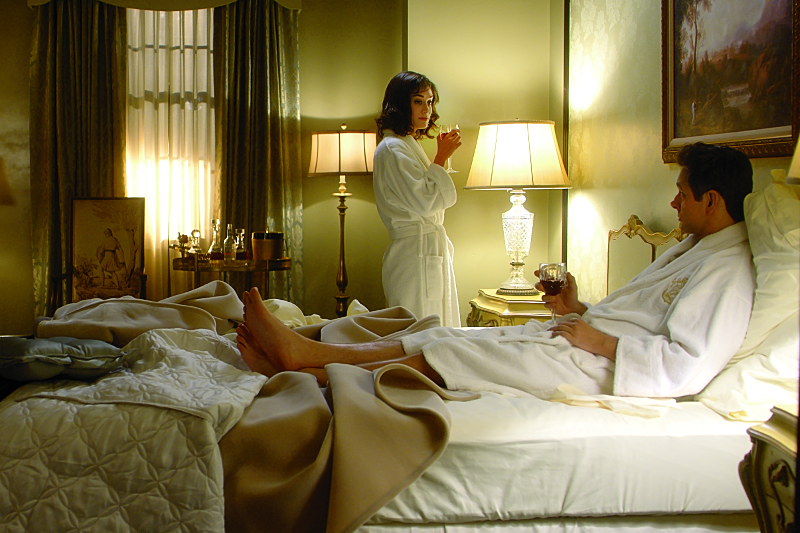
“There’s really not an interesting story here, Virginia, I promise you!” –Bill Masters
Is there anything better for a TV fan than discovering a brand-new great show? Maybe: there’s seeing an existing series leap to another level, delivering on its early hints of promise. That was Parks and Recreation after its muddled first episodes; it was Breaking Bad after its strike-shortened first season; earlier this year, it was The Americans donning the mighty wig of a top-tier TV drama.
Now it’s the second season of Masters of Sex that’s hit the narrative G-spot. And “Fight,” the show’s finest episode yet and one of the year’s best, is a confident hour that announces this show fully knows what it’s doing and why.
I assume any critic–and anyone who’s watched Mad Men–will compare “Fight” to “The Suitcase,” possibly that series’ best episode, which also used a famous boxing match as the backdrop for a story about the relationship between two central characters. That episode took Don and Peggy over a long, drunken night on the town and in the office, underscoring the similarities between the boss and his protege; it found a kind of platonic connection within their professional relationship. “Fight,” on the other hand, took the already intimate physical relationship between Bill and Virginia, colleague-lovers very different in personality and outlook, and tried to find the frequencies on which they resonate.
Though the episode began before their hotel room assignation and ended after it, it felt in some ways like an idyll that existed outside normal reality. Time is distended in it, for instance: in the span of an an 11-round boxing match, there was time for Bill and Virginia to have sex, order and eat dinner, talk about their pasts, have a boxing lesson, get a haircut, have more sex, dress and check out. It’s just a dramatic liberty, but it also gives the episode a slightly magical feeling, as if the hotel room is the portal to another, purgatorial dimension.
And how mesmerizing Michael Sheen and Lizzy Caplan are in purging their characters. The part of the reserved, suffering genius can be tedious, but it’s transfixing to see him peer out from behind the ice wall he’s built since childhood, and to see Virginia chip away at it. Any actor could play Bill as a man who doesn’t want to share his secrets; Sheen lets you see the hints that a part of him does want to. And as Virginia draws him out, pulling from him the story of being his father’s real-life punching bag, their conversation is as intimate, probing, sexual, as their sex. (Though the sex is nothing to sneeze at either. The scene in which the screen cuts to the boxing match to the sound of Virginia’s breath as she “makes herself feel good”? TKO.)
It’s fitting that the episode is structured around a fight, because it’s really Bill and Virginia comparing scars and bruises. And Caplan shows the subtlety with which she won a deserved Emmy nomination as she shows how she adapted in her own way to heartbreak. Where Bill became guarded and private, she became adventurous and outward-focused–but to a point: “Sex–fine, enjoy it if and when you can. It’s a biological function. But be safe, keep your heart out of it.” In the back-and-forth between them, you see how they make such effective lab partners: where he’s driven to look inward and analyze, she’s compelled to engage with the world, ask questions and explore. The difference comes down even to their hotel-register aliases: Bill wants to hide by making their story as bland and forgettable, Virginia by making it outlandishly fanciful.
The ambiguous-genitalia subplot, meanwhile, demonstrates how Masters of Sex has figured out how to use medicine and sex science to serve its themes: understanding sexuality, here as in last week’s “nymphomania” case, is important not just because it’s sexy or interesting, but because ignorance ruins people’s lives. And Bill’s ultimately unsuccessful showdown with the baby’s boorish father cuts directly to his childhood. For much of the first season, Bill’s abusive father seemed like backstory in search of a reason, but “Fight” links it directly to his work: one thing that drives his ambition is anger, the urge to fight bullies and the misinformation that empowers them. But knowledge can only take him so far: he’s more confident in cutting down the brutish dad with contempt–“You’re going to thank me for protecting you from your own poor judgment”–but in the end, he still ends up begging, fruitlessly, the self-satisfied jerk who says about his own baby, “A hole’s easier than a pole.”
What a set of performances; what an episode; what a show. And though Bill’s efforts to save a baby boy from gender confusion fail, “Fight” ends on an understatedly hopeful note. We don’t see, but hear over the final credits, the last seconds of the boxing match, in which Archie Moore–the aging underdog Bill identifies with–pulls out a historic 11th-round knockout. And Virginia has the last word, “I want to see how it ends,” as if to say that–for her and the other men and especially women who stand to gain from learning about sex–this fight is not nearly over.
More Must-Reads From TIME
- The 100 Most Influential People of 2024
- Coco Gauff Is Playing for Herself Now
- Scenes From Pro-Palestinian Encampments Across U.S. Universities
- 6 Compliments That Land Every Time
- If You're Dating Right Now , You're Brave: Column
- The AI That Could Heal a Divided Internet
- Fallout Is a Brilliant Model for the Future of Video Game Adaptations
- Want Weekly Recs on What to Watch, Read, and More? Sign Up for Worth Your Time
Contact us at letters@time.com